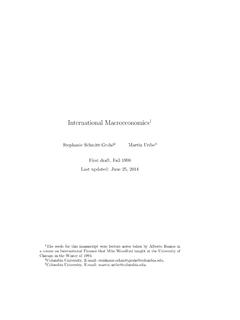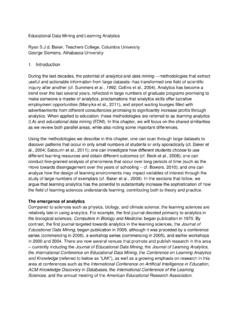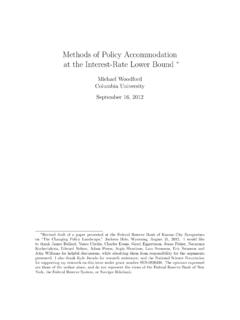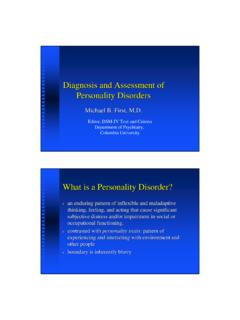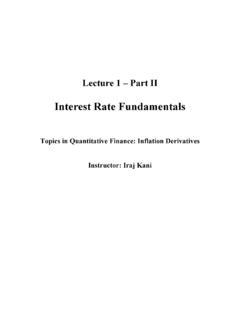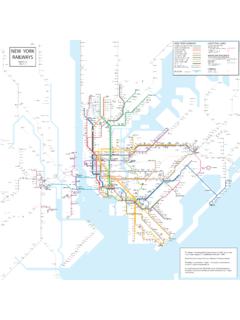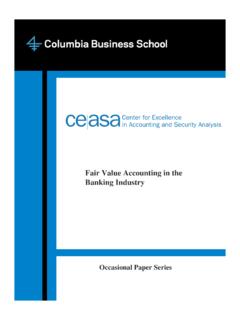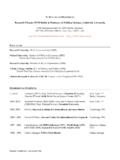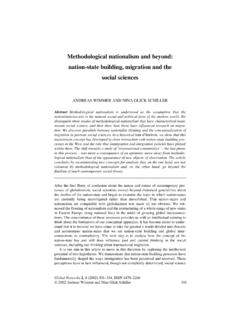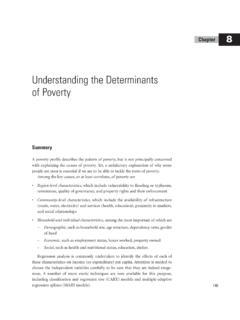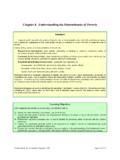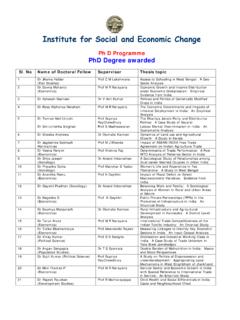Transcription of The Political Economy of Mass Media - Columbia University
1 The Political Economy of Mass Media Andrea PratLondon School of EconomicsDavid Str mbergStockholm UniversityNovember 26, 2013 AbstractWe review the burgeoning Political Economy literature on the in uence of mass mediaon politics and policy. This survey, which covers both theory and empirics, is organizedalong four main themes: transparency, capture, informative coverage, and ideologicalbias. We distill some general lessons and identify some open IntroductionOver the last decade, a sizeable number of economists have begun to study the behavior andpolitical e ects of mass Media . In this survey, we propose a way of organizing this bodyof research, we attempt to summarize the key insights that have been learnt so far, and wesuggest some potentially important open have structured the discussion into sections covering background, transparency, cap-ture, informative coverage and ideological bias.
2 We begin in Section 2 with a brief overviewof how economics and other disciplines have approached this eld and de ne the scope ofthis survey. In Section 3, we discuss the bene ts and costs of transparency in politics: underwhat situations do voters bene t from receiving more information?In Section 4 we will ask under what conditions the government will prevent the mediafrom performing their information provision task. Media capture is a present or latent riskin most developing countries and many developed ones. We will present a theory of endoge-nous capture and survey the growing empirical literature on the extent and determinants We thank Daron Acemoglu, Mark Armstrong, Marco Battaglini, Andrea Coscelli, Ruben Enikolopov, OlleFolke, Matthew Gentzkow, Torsten Persson, Maria Petrova, Michele Polo, Riccardo Puglisi, Jesse Shapiro,Andrei Shleifer, Jim Snyder, Helen Weeds, and audience members at the Econometric Society World Congress2010 for useful capture.
3 As will be seen,di erent sources of evidence provide support for the idea thatownership plurality is the most e ective defense against 5 discusses a crucial theme in Media studies, namely how informative mediacoverage a ects Political accountability and government policy. A model of policy choicewith endogenous Media coverage supplies an array of testable implications, used to organizethe existing empirical work. The key questions are: what drives Media coverage of politics;how does this coverage in uence government policy, the actions and selection of politicians,and the information levels and voting behavior of the public?Section 6 discusses ideological bias and its e ects on elections. We discuss the theoriesthat have been proposed to explain the existence of this bias. We survey methodologies tomeasure the ideological bias of individual Media outlets and we discuss the existing evidenceon the origin of bias and its e ect on elections.
4 Section 7 attempts to draw some conclusionsand suggest possible research focus of this survey is on work in Political Economy on the link between the mediaindustry and Political is only part of the research on this topic. Sincethe 1930s,scholars of politics and Media studies have analyzed the relationship betweenmedia and politics with a variety of methodologies. As it would be impossible to do justiceto their contributions here, we refer our readers to surveys by Dearing and Rogers (1996)and Scheufele (1999). However, we will often refer to literature outside Political Economy ,whenever it is useful for understanding the work under discussion. The next section o ersan extremely brief introduction to the history of this eld and attempts to identify the keyfeatures of the recent work by economists surveyed BackgroundTo put recent work by economists into perspective, some short background on Media researchin other elds may be helpful.
5 Modern empirical research on mass Media e ects began in the1930s, partly motivated by Hitler s and Mussolini s seemingly e ective use of Media in theirpropaganda and the simultaneous rapid increase in radio use. However, the rst large scale1 Our focus on the Political Economy of the Media leaves out an important body of research in industrialorganization and public economics that deals with the Media industry, mostly without any direct referenceto the Political system ( Anderson and Coate,2005). This literature is in uential in shaping competitionpolicy for the Media industry (Seabright and Von Hagen,2007).2studies found that the mass Media of radio and print had relatively minor direct e ects on howpeople voted (Lazarsfeld, Berelson and Gaudet, 1944). Media seemed mainly to strengthenvoters predispositions, because of pervasive selection and ltering.
6 Similarly, experimentalstudies showed that propaganda movies failed spectacularly in indoctrinating their viewers(Howland, Lumsdaine and She eld, 1949).In response to the minimal e ects ndings, researchers developed new theories of mediain uence that do not rely on people receiving information that con icts with their settingtheory refers to the idea that Media coverage of an issue makespeople believe that this issue is important (McCombs and Shaw, 1972).Primingis the ideathat people evaluate politicians based on the issues covered in the Media (Iyengar and Kinder,1987). Both are memory-based models, assuming that people form attitudes based on theconsiderations that are most accessible and Media coverage improves accessibility. They aresummarized by the famous comment by Cohen (1963) that while the Media cannot tell thepublic what to think, they can have a great impact on what the public thinks is instead based on the assumption that how an issue is characterized in news reportscan have an in uence on how it is understood by audiences.
7 For example, citizens opinionsabout a Ku Klux Klan rally may depend on whether it is framed as a free speech issue or apublic safety issue. Empirically, most studies focus on Media e ects on audiences and votersusing either survey data or by performing laboratory is a truly interdisciplinary eld, and Political Economy has bene tted enormouslyfrom the knowledge acquired in other disciplines. However, at the risk of over-generalizing,the Political Economy contributions tend to be characterized by a number of , in contrast to most previous work, economic models of Media in uence tend to focuson the informational role of mass Media , on the premise that information makes a di erenceto how people vote and that mass Media provide the bulk of the information that people usein elections. A second and related innovation is the focus on economic outcomes.
8 As in mostpolitical Economy , the nal objective of interest is not the behavior of the Political systembut its outcome in terms of variables, such as public goods provision, that directly enter thecitizens preferences. Third, economists have emphasized the use of formal game theory formodeling interactions within the Media industry and between the Media and other ,for instance,the subtle interaction among Media outlets that compete for audience bypresenting information in a biased way, discussed in section 5. The use of formal game-3theoretical modeling has led to an array of testable implications regarding complex , on the empirical side, there is a strong emphasis on identifying causal mediae ects using observational data. Often, the e ects of rapid changes in Media exposure dueto the entry of a new mass Media or Media channel have been used.
9 Finally, our empiricalwork has a strong international nature. The data comes from a large array of countries, atvarious stages of development and with di erent Political and Media TransparencyTo set the stage, we rst ask whether having more information is bene cial to voters. Thisis done in a simple and general agency framework. These theoretical insights are useful forinterpreting the freedom of information laws that we observe in well-functioning democracies,as well as for understanding the possible impact of information from Media on types of information are bene cial to the functioning of a democracy? Naturally,some types are intrinsically bad, like personal details of regular citizens or intelligence thatcould jeopardize national interests. While de ning the scope of privacy protection and na-tional security can be di cult in practice, there is general agreement that these exceptionsshould not prevent the Media from reporting freely on government activity, except in veryspecial circumstances.
10 Potentially more important is the possibility that more informationabout government activities may actually create perverse incentives for politicians which will,in the end, hurt the us begin with a benchmark result. Under complete contracting, Holmstr m (1979)shows that in any moral hazard problem, the principal is never hurt by observing additionalsignals about the output of the agent. The economic intuition behind this result is strong. Asthe principal can design the contract she o ers to the agent, any additional information willbe useful in reducing the rent the agent derives from the presence of asymmetric simple intuition from moral hazard can be used to rationalize the principle of opengovernment. This is a legal presumption that anything the government does should be opento the scrutiny of citizens and the Media .

